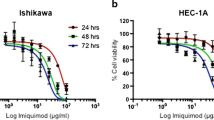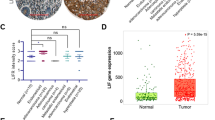Abstract
Purpose
Aberrant activation of STAT3 signal pathway promotes tumor progression in many solid tumor types, including cervical cancer and endometrial cancer. BBI608, the STAT3 inhibitor had been reported in previous studies for restraining cancer stem cells. However, whether BBI608 is available for inhibiting the proliferation of cervical cancer or endometrial cancer remains poorly understood. This study investigated the anti-tumor effect and molecular mechanism of BBI608 on the patient-specific primary cells (PSPC) generated from cervical and endometrial cancer in vitro.
Methods
PSPCs were obtained from four patients via biopsy. The cell viability was analyzed by the CCK8 assay. The PSPCs were treated with various concentrations of BBI608 or/and paclitaxel; and then, western blot was applied to investigate the expression of phosphorylated STAT3 (pSTAT3).
Results
The PSPCs cell viability was reduced after treated with BBI608 at a lower concentration. Western blot results showed a reduction trend of pSTAT3 after PSPCs treated with BBI608. Our results demonstrated that BBI608 at the certain concentrations worked well in reducing the cell viability of PSPC from the patients who suffered from cervical cancer and endometrial cancer.
Conclusions
In this study, the patient-specific primary cell (PSPC) was used as the pre-clinical model for investigating the efficiency of BBI608 in reducing cancer cells viability. BBI608, at a clinical-relevant concentration, had valid efficiency in PSPCs from the patients. The dose of drugs treatment and the measured results were more valuable for further guiding clinical trials.






Similar content being viewed by others
References
Bray F, Ferlay J, Soerjomataram I, Siegel RL, Torre LA, Jemal A. Global cancer statistics 2018: GLOBOCAN estimates of incidence and mortality worldwide for 36 cancers in 185 countries. CA Cancer J Clin. 2018;68(6):394–424.
Tsikouras P, Zervoudis S, Manav B, Tomara E, Galazios G. Cervical cancer: screening, diagnosis and staging. J BUON. 2016;21(2):320–5.
Olusola P, Banerjee HN, Philley JV, Dasgupta S. Human papilloma virus-associated cervical cancer and health disparities. Cells. 2019;8(6):622–34.
Burki TK. Novel mutations in cervical cancer. Lancet Oncol. 2017. https://doi.org/10.1016/S1470-2045(17)30080-3.
Gutiérrez-Hoya A, Soto-Cruz I. Cells role of the JAK/STAT pathway in cervical cancer: its relationship with HPV E6/E7 oncoproteins. Cells. 2020;9(10):2297.
Gao C, Zhou C, Zhuang J, Liu L, Liu C, Li H, et al. MicroRNA expression in cervical cancer: novel diagnostic and prognostic biomarkers. J Cell Biochem. 2018;119(8):7080–90.
Chen MW, Yang ST, Chien MH, Hua KT, Wu CJ, Hsiao SM, et al. The STAT3-miRNA-92-Wnt signaling pathway regulates spheroid formation and malignant progression in ovarian cancer. Can Res. 2017;77(8):1955–67.
Wang T, Francois FJ, Heehyoung L, Li YJ, Tripathi SC, Yue C, et al. JAK/STAT3-regulated fatty acid β-oxidation is critical for breast cancer stem cell self-renewal and chemoresistance. Cell Metab. 2018;27(6):1357.
Zhang X, Sai B, Wang F, Wang L, Wang Y, Zheng L, et al. Hypoxic BMSC-derived exosomal miRNAs promote metastasis of lung cancer cells via STAT3-induced EMT. Mol Cancer. 2019. https://doi.org/10.1186/s12943-019-0959-5.
Alraouji NN, Al-Mohanna FH, Ghebeh H, Arafah M, Almeer R, Al-Tweigeri T, et al. Tocilizumab potentiates cisplatin cytotoxicity and targets cancer stem cells in triple-negative breast cancer. Mol Carcinog. 2020;59(9):1041–51.
Barbosa EJ, Lbenberg R, Araujo G, Chacra N. Niclosamide repositioning for treating cancer: challenges and nano-based drug delivery opportunities. Eur J Pharm Biopharm. 2019. https://doi.org/10.1016/j.ejpb.2019.05.004.
Guha P, Gardell J, Darpolor J, Cunetta M, Lima M, Miller G, et al. STAT3 inhibition induces Bax-dependent apoptosis in liver tumor myeloid-derived suppressor cells. Oncogene. 2019;38(4):533–48.
Han D, Yu T, Dong N, Wang B, Sun F, Jiang D. Napabucasin, a novel STAT3 inhibitor suppresses proliferation, invasion and stemness of glioblastoma cells. J Exp Clin Cancer Res. 2019. https://doi.org/10.1186/s13046-019-1289-6.
MacDonagh L, Gray SG, Breen E, Cuffe S, Finn SP, O’Byrne KJ, et al. BBI608 inhibits cancer stemness and reverses cisplatin resistance in NSCLC. Cancer Lett. 2018;428:117–26.
Schmidtova S, Dorssers L, Kalavska K, Gillis A, Looijenga L. Napabucasin overcomes cisplatin resistance in ovarian germ cell tumor-derived cell line by inhibiting cancer stemness. Cancer Cell Int. 2020. https://doi.org/10.1186/s12935-020-01458-7.
Takemoto S, Ushijima K, Kawano K, Yamaguchi T, Terada A, Fujiyoshi N, et al. Expression of activated signal transducer and activator of transcription-3 predicts poor prognosis in cervical squamous-cell carcinoma. Br J Cancer. 2009;101(6):967–72.
Li H, Qian Y, Wang X, Pi R, Zhao X, Wei X. Targeted activation of Stat3 in combination with paclitaxel results in increased apoptosis in epithelial ovarian cancer cells and a reduced tumour burden. Cell Prolif. 2020;53(1): e12719.
Zhang X, Qin T, Zhu Z, Hong F, Xu Y, Zhang X, et al. Ivermectin Augments the In Vitro and In Vivo Efficacy of Cisplatin in Epithelial Ovarian Cancer by Suppressing Akt/mTOR Signaling. Am J Med Sci. 2020;359(2):123–9.
Lay V, Yap J, Sonderegger S, Dimitriadis E. Interleukin 11 regulates endometrial cancer cell adhesion and migration via STAT3. Int J Oncol. 2012;41(2):759–64.
Huang Y, Yang N. MicroRNA-20a-5p inhibits epithelial to mesenchymal transition and invasion of endometrial cancer cells by targeting STAT3. Int J Clin Exp Pathol. 2018;11(12):5715–24.
Bi S, Chen K, Feng L, Fu G, Yang Q, Deng M, et al. Napabucasin (BBI608) eliminate AML cells in vitro and in vivo via inhibition of Stat3 pathway and induction of DNA damage. Eur J Pharmacol. 2019;855:252–61.
Feng KR, Wang F, Shi XW, Tan YX, Zhao JY, Zhang JW, et al. Design, synthesis and biological evaluation of novel potent STAT3 inhibitors based on BBI608 for cancer therapy. Eur J Med Chem. 2020;201: 112428.
Zhao H, Wang W, Zhao Q, Hu G, Deng K, Liu Y. BCL3 exerts an oncogenic function by regulating STAT3 in human cervical cancer. Onco Targets Ther. 2016;9:6619–29.
Li F-H, Xiang L, Ran L, Zhou S, Huang Z. BNIP1 inhibits cell proliferation, migration and invasion, and promotes apoptosis by mTOR in cervical cancer cells. Eur Rev Med Pharmacol Sci. 2019. https://doi.org/10.26355/eurrev_201902_17096.
Wang F, Shan S, Huo Y, Xie Z, Fang Y, Qi Z, et al. MiR-155-5p inhibits PDK1 and promotes autophagy via the mTOR pathway in cervical cancer. Int J Biochem Cell Biol. 2018;99:91–9.
Duthaler U, Suenderhauf C, Karlsson MO, Hussner J, Schwabedissen Meyer Zu H, Krahenbuhl S, et al. Population pharmacokinetics of oral ivermectin in venous plasma and dried blood spots in healthy volunteers. Br J Clin Pharmacol. 2019;85(3):626–33.
Ibrahim ME, Chang C, Hu Y, Hogan SL, Mercke N, Gomez M, et al. Pharmacokinetic determinants of cisplatin-induced subclinical kidney injury in oncology patients. Eur J Clin Pharmacol. 2019;75(1):51–7.
Stage TB, Bergmann TK, Kroetz DL. Clinical Pharmacokinetics of Paclitaxel Monotherapy: An Updated Literature Review. Clin Pharmacokinet. 2018;57(1):7–19.
Zhou Q, Peng C, Du F, Zhou L, Shi Y, Du Y, et al. Design, synthesis and activity of BBI608 derivatives targeting on stem cells. Eur J Med Chem. 2018;151:39–50.
Acknowledgements
This work was supported by the Guangdong Basic and Applied Basic Research Foundation [2019A1515011725, 2019A1515011191]; Science and technology projects of GDPH [2018bq03]; NSFC Incubation Program of GDPH [KY012021158]; Guangdong Medical Science and Technology Research Fund [A2020016, A2020537].
Author information
Authors and Affiliations
Contributions
M-BL, and H-YZ designed research; JC, S-TH, and W-HL performed research and analyzed data; H-SZ, J-MH, Y-CL, H-HC, and P-FD collected tumor samples; and S-TH, TS, TG composed the paper.
Corresponding author
Ethics declarations
Conflict of interest
The authors declare that they have no competing interests.
Ethical approval
All of the protocols using human specimens were approved by the Zhuhai People’s Hospital, and informed consent was obtained from all of the subjects.
Additional information
Publisher's Note
Springer Nature remains neutral with regard to jurisdictional claims in published maps and institutional affiliations.
Supplementary Information
Below is the link to the electronic supplementary material.
Rights and permissions
Springer Nature or its licensor (e.g. a society or other partner) holds exclusive rights to this article under a publishing agreement with the author(s) or other rightsholder(s); author self-archiving of the accepted manuscript version of this article is solely governed by the terms of such publishing agreement and applicable law.
About this article
Cite this article
Chen, J., Huang, S., Li, H. et al. STAT3 inhibitor BBI608 reduces patient-specific primary cell viability of cervical and endometrial cancer at a clinical-relevant concentration. Clin Transl Oncol 25, 662–672 (2023). https://doi.org/10.1007/s12094-022-02970-0
Received:
Accepted:
Published:
Issue Date:
DOI: https://doi.org/10.1007/s12094-022-02970-0




